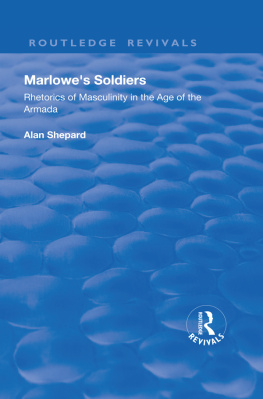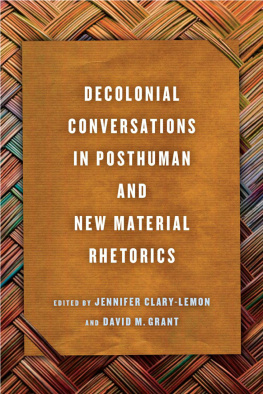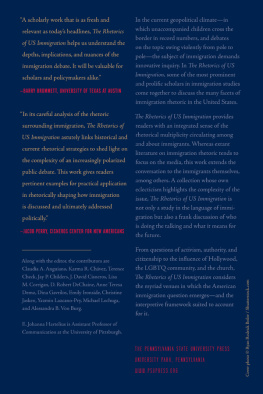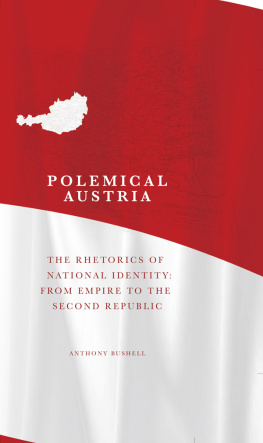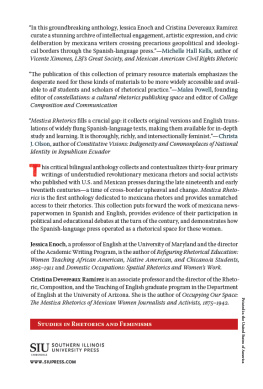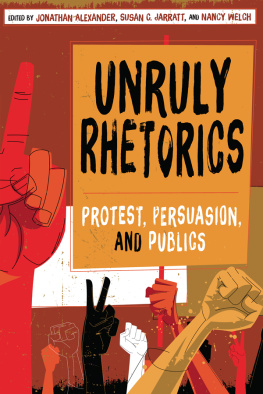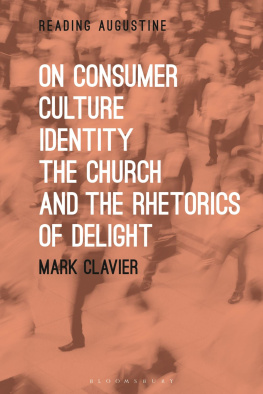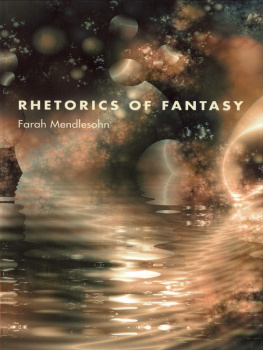Benson Thomas W. - Rhetorics Early Days The Idea of Rhetoric before Plato
Here you can read online Benson Thomas W. - Rhetorics Early Days The Idea of Rhetoric before Plato full text of the book (entire story) in english for free. Download pdf and epub, get meaning, cover and reviews about this ebook. City: Columbia, year: 2017, publisher: University of South Carolina Press, genre: Romance novel. Description of the work, (preface) as well as reviews are available. Best literature library LitArk.com created for fans of good reading and offers a wide selection of genres:
Romance novel
Science fiction
Adventure
Detective
Science
History
Home and family
Prose
Art
Politics
Computer
Non-fiction
Religion
Business
Children
Humor
Choose a favorite category and find really read worthwhile books. Enjoy immersion in the world of imagination, feel the emotions of the characters or learn something new for yourself, make an fascinating discovery.
- Book:Rhetorics Early Days The Idea of Rhetoric before Plato
- Author:
- Publisher:University of South Carolina Press
- Genre:
- Year:2017
- City:Columbia
- Rating:4 / 5
- Favourites:Add to favourites
- Your mark:
- 80
- 1
- 2
- 3
- 4
- 5
Rhetorics Early Days The Idea of Rhetoric before Plato: summary, description and annotation
We offer to read an annotation, description, summary or preface (depends on what the author of the book "Rhetorics Early Days The Idea of Rhetoric before Plato" wrote himself). If you haven't found the necessary information about the book — write in the comments, we will try to find it.
Rhetorics Early Days The Idea of Rhetoric before Plato — read online for free the complete book (whole text) full work
Below is the text of the book, divided by pages. System saving the place of the last page read, allows you to conveniently read the book "Rhetorics Early Days The Idea of Rhetoric before Plato" online for free, without having to search again every time where you left off. Put a bookmark, and you can go to the page where you finished reading at any time.
Font size:
Interval:
Bookmark:

Logos without Rhetoric
Studies in Rhetoric/Communication
Thomas W. Benson, Series Editor
Logos without Rhetoric

The Arts of Language before Plato
Edited by
Robin Reames
Afterword by
Edward Schiappa

The University of South Carolina Press
2017 University of South Carolina
Published by the University of South Carolina Press
Columbia, South Carolina 29208
www.sc.edu/uscpress
26 25 24 23 22 21 20 19 18 17
10 9 8 7 6 5 4 3 2 1
Library of Congress Cataloging-in-Publication Data
can be found at http://catalog.loc.gov/
ISBN 978-1-61117-768-8 (cloth)
ISBN 978-1-61117-769-5 (ebook)
Front cover photograph: antpkr/istockphoto.com
It is perhaps a true proverb, which says that the beginning of anything is the most important; hence it is also the most difficult. For, as it is very powerful in its effects, so it is very small in size and therefore very difficult to see. When, however, the first beginning has been discovered, it is easier to add to it and develop the rest. This has happened, too, concerning rhetorical speeches, and also practically all the other arts.
Aristotle
On Sophistical Refutations
Contents
Terry L. Papillon
Robert N. Gaines
Carol Poster
Thomas Rickert
Robin Reames
Marina McCoy
David C. Hoffman
Michael Svoboda
Edward Schiappa
Carol Poster
Carol Poster
Robert Gaines
Series Editors Preface
What are the origins of rhetoric in Western culture? To this day most students new to the study of the history of rhetoric are introduced to the story of Corax and Tisias, who were said by the Greeks to have written the first handbooks on oratory in the fifth century B.C.E. in Sicily and whose teachings quickly migrated to Athens. But earlier practices of argument and persuasion reach back to the origins of literacy and beyond in the mists of memory in oral culture. Against this tradition of gradually developing practice and increasingly self-conscious practice, Edward Schiappa, writing in the 1990s, offered a contrasting view. In 1990, Schiappa argued that it was not until fourth-century Athens, with Platos dialogue Gorgias, that the term rhetoric (rhtorik) was coined, and that the naming of the art enabled the foundation of what may truly be called rhetorical theory.
In Logos without Rhetoric: The Arts of Language before Plato, Robin Reames and the contributors she has brought together consider the intellectual and material history of rhetoric, eloquence, and oratory before Plato. The result is a fascinating, vivid, and learned journey, guided by scholars of distinction and originalityTerry L. Papillon, Robert N. Gaines, Carol Poster, Thomas Rickert, Marina McCoy, David C. Hoffman, and Michael Svoboda, along with Robin Reames as editor and contributor and an afterword by Edward Schiappa.
The intellectual delights of this richly documented and theoretically dazzling volume are augmented by a spirit of intellectual generosity that shines through every contending theoretical and historical argument. The result is a work that is important, original, and at the same time lucid and accessiblea model of scholarly eloquence.
Thomas W. Benson
Preface and Acknowledgments
The idea for this volume began as a panel on Heraclitus that I organized for the Rhetoric Society of America biennial conference, which included presentations by Jason Helms, David Hoffman, Carol Poster, and myself. I am grateful to the lively discussion of the panel presenters and the attendees for inspiring the larger work of this volume, which aims to gather and reconsider some of the intellectual antecedents for the ascendance of rhetoric in fourth-century B.C.E. Greece. Although originally the discussion focused exclusively on Heraclitus, and considered the hermeneutic traditions that exclude his thought from the history of rhetoric, our considerations led us to entertain more broadly how these hermeneutic traditions constrain our view of many other figures as well, where strict and firm distinctions between poets, philosophers, sophists, and rhetoricians anachronistically dictate how and to what extent these thinkers are viably associated with the birth of rhetoric and rhetorical theory. I am grateful to all of the contributors, whose enthusiasm for this theme brought the project into being.
In addition the contributors, I wish to thank Jim Denton, Linda Fogle, and the editorial staff at the University of South Carolina Press, whose hard work has made this volume possible, and to the eagle-eyed copyeditors who see the errors of our ways. We the authors are grateful to the anonymous reviewers who offered invaluable feedback and commentary at earlier stages of the project. I also wish to thank Bentley University; the Jeanne and Dan Valente Center for Arts and Sciences at Bentley, and its director, Christopher Beneke. The centers generous support made beginning the work for this volume possible. I am grateful as well to the librarians and library services at Harvards Widener and Houghton libraries, whose outstanding collections are nothing less than inspirational. Thanks also are due to my colleagues and students at the University of Illinois at Chicago, in particular Ralph Cintron, Monica Westin, and Nathan Shephard, as well as William McNeill of DePaul University, all of whom participated in a roundtable discussion of this and other work. And of course, heartfelt thanks goes to Edward Schiappa, whose scholarship on the beginning of rhetorical theory in Greece laid a firm foundation on which to build this work, and whose interest in this project is generously offered in the afterword.
Finally, I wish to thank my partner, Drew Dalton, whose support, encouragement, generosity, and vast knowledge of the history of philosophy make my work both more possible and more worthwhile, and my daughter, Thea, whose laughter, love, and patience make all of it more fun.
Earlier versions of two of the essays in this volume appeared previously as journal articles. An early version of my essay on Heraclitus appeared as The Logos Paradox: Heraclitus, Material Language, and Rhetoric in Philosophy and Rhetoric 46:3, 32850 ( 2013 Pennsylvania State University Press), and a previous version of Thomas Rickerts essay on Parmenides appeared as Parmenides, Ontological Enaction, and the Prehistory of Rhetoric in Philosophy and Rhetoric 47:4, 47293 ( 2014 Pennsylvania State University Press). Although the essays included here differ substantially from those earlier versions, they are used with the permission of the Pennsylvania State University Press.
A Note on Translations
The authors of these essays have consulted various translations for the primary ancient texts. For this reason, the primary texts are cited throughout the volume and in the bibliography by the translators last names. Primary ancient texts that are not specifically quoted, either in the original Greek or in translation, are not listed in the bibliography. All complete works by ancient authors referenced but not quoted in this book (for example, Homer, Hesiod, Aristophanes, Thucydides, Plato, Xenophon, Aristotle, Cicero, and Diogenes Laertius) are available in the Loeb Classical Library published by Harvard University Press. Partial works and fragments of ancient authors are available in Barnes (1982 and 1987) and Sprague (1972). The authors include the original or transliterated Greek text where they feel it would be valuable for readers of Greek.
Next pageFont size:
Interval:
Bookmark:
Similar books «Rhetorics Early Days The Idea of Rhetoric before Plato»
Look at similar books to Rhetorics Early Days The Idea of Rhetoric before Plato. We have selected literature similar in name and meaning in the hope of providing readers with more options to find new, interesting, not yet read works.
Discussion, reviews of the book Rhetorics Early Days The Idea of Rhetoric before Plato and just readers' own opinions. Leave your comments, write what you think about the work, its meaning or the main characters. Specify what exactly you liked and what you didn't like, and why you think so.



